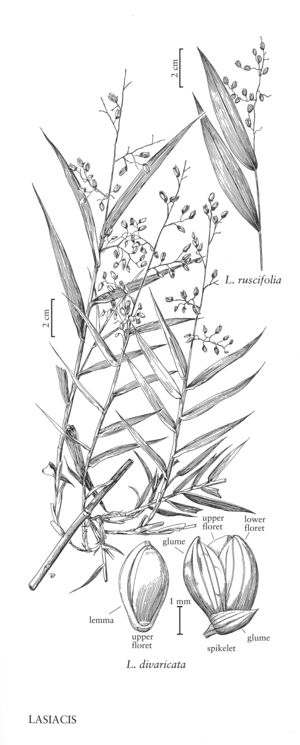Lasiacis ruscifolia
Plants perennial; cespitose. Culms 1-8 m long, 5-12 mm thick, hollow, arching or clambering. Sheaths glabrous, puberulent, or hispid with papillose-based hairs, margins ciliate; ligules 0.2-1 mm, glabrous or ciliate; blades 2-16 cm long, 8-56 mm wide, ovate to ovate-lanceolate. Panicles 2-22 cm; lower branches to 9 cm, divergent. Spikelets 2.6-4 mm, globose; lower glumes 1.2-2.2 mm, 9-13-veined; lower florets sterile; upper glumes 11-13-veined; upper florets 2.8-3.6 mm long, 2-2.9 mm wide, dark brown to grayish-black at maturity; upper lemmas usually with a distinct shelf at the base, from which a sterile projection often arises; upper paleas usually deeply concave; anthers 1.4-2.3 mm, white; stigmas white. Caryopses 2-2.5 mm. 2n = 36.
Discussion
The range of Lasiacis ruscifolia extends from south¬ern Florida to Peru. Plants in the Flora region belong to L. ruscifolia (Kunth) Hitchc. var. ruscifolia, which dif¬fers from L. ruscifolia var. velutina (Swallen) Davidse in being scabrous or puberulent, rather than velutinous, on the panicle branches.
Selected References
None.
